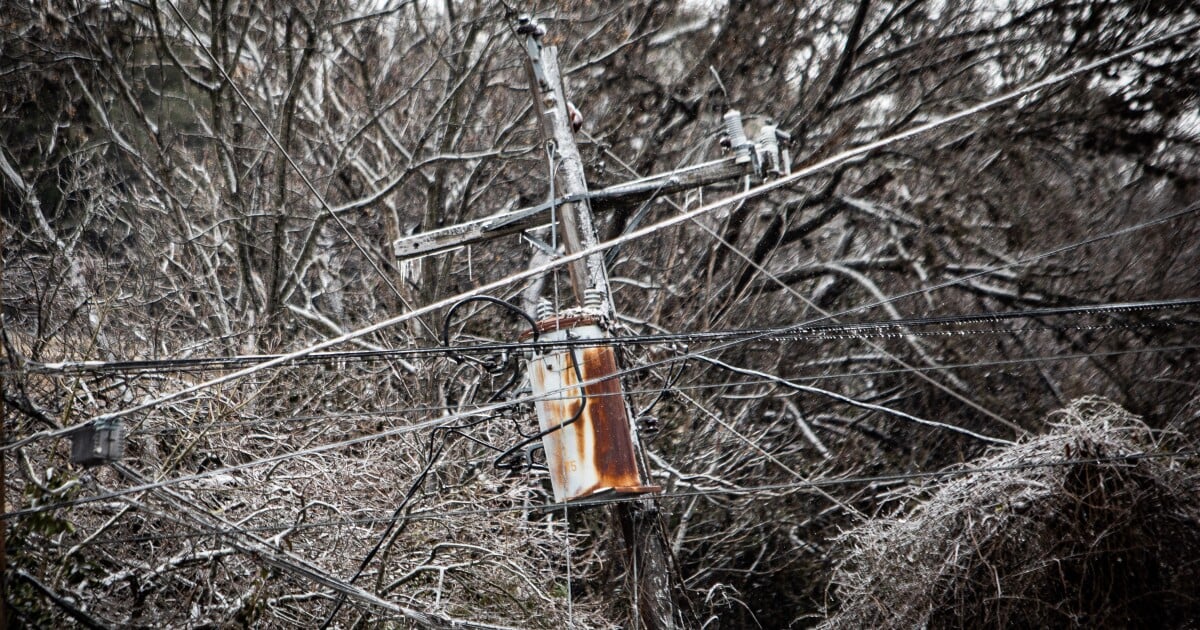Almost three years since the deadly Texas blackout of 2021, a panel of judges from the First Court of Appeals in Houston has ruled that big power companies cannot be held liable for failure to provide electricity during the crisis. The reason is Texas’ deregulated energy market.
The decision seems likely to protect the companies from lawsuits filed against them after the blackout. It leaves the families of those who died unsure where next to seek justice.
In February of 2021, a massive cold front descended on Texas, bringing days of ice and snow. The weather increased energy demand and reduced supply by freezing up power generators and the state’s natural gas supply chain. This led to a blackout that left millions of Texans without energy for nearly a week.
The state has said almost 250 people died because of the winter storm and blackout, but some analysts call that a serious undercount.
It is almost like natural monopolies, such as primary power generation and supply, should be under the control of the Government and not private individuals.
They all used to be. Then Reagan and Clinton happened.
ding ding ding. We have a winner! Give that man a prize!
Thank you, thank you.
My prize will sit proudly in my woman cave.
Woman caave… go on
Down, boy.
Can you point me to where I might learn more about this?
This is pretty good article about how and why.
Most places that are not Texas still have something resembling the old school utility model where the state effectively grants a license to a private company to operate and manage the grid, which is itself a public right of way. This is governed by a state appointed utility board.
Yep. Essential services should not be for profit.
No no… Checks the GOP playbook: we just need to offer a premium power support plan so if the power goes out they’ll provide you a backup generator. It just costs twice the normal rate.
I know your joking here, but this is actually the path forward and is being implemented in other states and countries.
The power company provides at a discount or for free a home backup battery to the residence. If not free, You pay off the battery at a very affordable rate but end up with a smaller power bill as the power company can access its power to balance the load, filling it up when power is cheap and the battery being used when power is expensive.
In a blackout, the home owner gets to use the battery and doesn’t suffer an outage.
It makes the grid more secure by dispersing it around thousands of homes instead of a large expensive failure points and gives them an improved ability to balance the overall load instead of needing a gas peaker plant.
I think it was recently announced that a Vermont power company was going to onboard 100% of their users in the next few years, but it’s happening elsewhere too. If a tree takes something down in a snow storm, people won’t lose power giving them time to fix it.
That actually seems like a really good idea on the infrastructure side. We should still get rid of private power companies.
We should still get rid of private power companies.
Absolutely.
Batteries are consumable though. Only so much usage available
An LFP battery will last over a decade of daily full discharges, and that’s not going to be what happens, and even then, it’s still 80%.
Probably looking at
30-4020-30 years before wanting to replace it due to energy levels.Peaker plants also require maintenance and staffing and other costs associated with them.
The batteries being consumable isn’t a problem.
Edit: and gas from a peaker plant is consumed too
The issue here is specifically that they’re not monopolies any more, because of deregulation
Ironically, if they were a monopoly, they would have an obligation to provide power in emergencies, per the ruling.
So this is more like the spiderman pointing at spiderman thing.
What are yah, some sorta communist? /s He’s sayin private companies shouldnt be fuckin us over, get him! /s
That’s communism and we are a capitalist country.
The right thing to do under a capitalist economy is to buy the government and give yourself a monopoly.
This isn’t a natural monopoly, it’s protected by legislature and cronyism.
A proper capitalist approach to utilities, then the pipes and wires need to be considered no different then the road they are installed on. Recoup money by selling metered wholesale access to the carriers and utilities.
But we don’t have proper capitalism. We have this bastardized American version that sucks.
We the People of the United States, in Order to form a more perfect Union, establish Justice, insure domestic Tranquility, provide for the common defence, promote the general Welfare, and secure the Blessings of Liberty to ourselves and our Posterity, do ordain and establish this Constitution for the United States of America.
We settled it before the damn constitution even started. How these nitwits in DC don’t see how publicly run infrastructure doesn’t provide for the common defense or promote general welfare is beyond me. But I guess running water, heat, affordable healthcare, and an ability to communicate with each other and the rest of the world doesn’t count under that, somehow.
Maybe if the courts took the founders intent from the Prologue instead of the secret letters to their mistresses, we’d have a functional system. But that’s just my opinion.
A government providing services is not communism, it’s a first-world standard.
Three cheers for privatization of public utilities! /s
As an aside, I am gutted by 250+ people losing their lives because Texan politicians can’t get their act together to hold companies responsible. Legislation works … and politicians can, and should, make the laws.
This was the second time it happened too. It happened ten years prior as I recall. So they did nothing then. Did nothing later. No responsibility for anything later. Fuck Texas.
deleted by creator
That storm was completely crazy though. I don’t think Texas has EVER experienced anything like it before.
That will be a yearly occurrence now.
deleted by creator
Maybe they decided the right people were getting hurt?
It’s less about the right people getting hurt, and more about the right people making bank (e.g. themselves).
Though they’ll chalk up people that they would prefer not to be in their state to be an absolute win if they can legally kill them
deleted by creator
They do have their act together. It just doesn’t include doing anything good for Texans.
Texans must love the abuse, they keep voting for it.
Worth noting this ruling is explicitly based on statewide legislation, meaning this could be changed at any time, if the legislature cared at all.
You really do get exactly what you vote for.
There’s also a lot of voter suppression and gerrymandering.
Remember when conservatives blamed “windmills” for this? All while conservatives in charge of Texas raked in millions of dollars in campaign donations from ERCOT members. Conservatives will gleefully watch your family die for fun or profit.
A conservative is incapable of empathy or remorse. Be very careful in your dealings with them. They do not value the lives of others the way normal people do.
Conservatives will gleefully watch your family die for fun or profit.
From their beach cabana in Cancun, no less.
Rafael Cruz 😂
Canada apologizes for exporting that to America.
Don’t worry about it. We just assume Canada is too sane to support that craziness
Oh I wish that were true. The Conservative party leader, Pierre Poilievre (aka PP or Millhouse) is on the verge of becoming a Trump syncophant.
Do you mean Fled?
I thought there was a law passed where you have to call people by their ”deadname". If so, all should be calling him Rafael /jk
The greatest Canadian to ever live
They can’t be bargained with. They can’t be reasoned with. They don’t feel pity, or remorse, or fear. And they absolutely will not stop, ever, until we are dead.
…or until they are dead.
You’re not wrong!
I see a ginormous BBQ coming soon.
I love long bacon
Incapable of truth, too. As a lawyer, I will not take them on as clients. They lie constantly to justify their emotions. That’s really it.
But muh feewings!
As an aside, I used to live in a remote fishing area and we had tons of American visitors. I remember one woman told me she knew Obama was the devil because she felt “the evil” emanating from him.
smdh
Corporations are people, my friend. Just people with all the rights and no responsibilities.
Yeah … SCOTUS.
If there are no people, there is no company. If there are no companies, people will survive.
That takes care of whatever stupidity SCOTUS was thinking when they made companies and people equal.
They’re not even equal. Corporations are given more freedom than actual people.
You can’t arrest a company. You apparently can’t even arrest the company’s executives for the company’s crimes.
I really want to figure out how to make a company and sell it all my debt.
You set up a company A. You also make a consultant company B. Company A hires very highly paid consultants from company B. Meanwhile you make paintings. You sell those paintings to company B at high prices with the money you got from company A. Now your debts are gone and company A is in debt. Fold company A and B. Add in some shell companies in the Bahamas if needed.
But, you need to have enough money to set up companies, have expensive accountants and lawyers, and to pay off some officials. You’ll have to be rich to become more rich basically.
Don’t follow this advice, it’s just fiction.
It’s called the Texas two step.
You file business papers in Texas and open an account there.
You use that business to buy all your underwater assets and other liabilities, leaving you free and clear. Then you declare bankruptcy with your Texas company, wiping out the debts. It what you do when grandpappy and the old board sold asbestos to everyone and their kids and now that you’re in charge you just want that to go away so you can enjoy your trust fund without fear of any destitute widows or their children trying to take any of it.
In any normal state, this is treated as a sham transaction or a straw purchase and is void ab initio. In Texas though, as a handout to the mining, chemical, and business insurance industries, you can follow none of the corporate formalities needed anywhere else to preserve your corporate viel, and just declare that your company is now two, unrelated companies, sort of like that movie Twins where, even though they are genetically identical and born at the same time from the same parents, one of the newborn companies has all the good stuff and the other has all the crap, and you can pretend it was separated at birth, like it never even existed. And that’s how you do the Texas two step. Step three actually is profit.
Were you born to rich parents?
Sadly no, I’ve been bootstrapping it.
You’re probably out of luck.
And no taxes or very little.
Corporate taxes are a regressive tax on the poor. There’s no benefit to taxing a business instead of people directly, and serious harm caused.
Taxing Amazon doesn’t hurt Jeff Bezos. It just makes products more expensive for people that already struggle to afford them. It doesn’t even effect Amazon’s profit margin.
It’s the structure of taxing that is the problem. If we tax their holdings or assets, tax the fuck out of their stocks exchanges. Force business to do business and make hording too expensive. Companies with billions in cash sitting in offshore bank accounts is disgusting and should be abolished.
Companies with billions in cash sitting in offshore bank accounts is disgusting and should be abolished.
This is how businesses grow, though. Having cash on hand is extremely important, and the amount necessary scales with the size of the business. It’s effectively overhead.
All of these ideas make things more expensive for poor people for no reason.
I don’t think you understand how much money big corporations hoard. Investment isn’t what I am talking about. Pure cash holdings, it’s really not normally done like this.
I literally worked for a fortune 100 company. I know exactly how much, because they report on it internally, especially during big shit like COVID.
There’s nothing wrong with a company having money in the bank. That’s an extremely good thing, especially for financial and tech companies.
I don’t know why people hate companies making money at all. If individual people are making more money than is good for society, tax then. If Jeff Bezos owning Amazon pisses you off, carve you off a slice. No issue there.
Taxing companies makes the lives of poor people harder, so I’m against that.
Cops don’t have to serve and protect or abide by the law. Power companies don’t have to supply power. People who sell you things can deny you access to them.
Hey this is fun, let’s do more!
The whole social contract thing in the USA is giving off an EULA vibe these days.
Reminds me of Kimberly Latrice Jones’ chat.
that is the greatest compliment thank you
Deregulating the electricity industry has been a complete and utter disaster.
I hate this fucking state so much.
The free market solution would allow communities to negotiate contracts that DID hold the provider liable and allow competitors to emerge that would focus on different aspects like reliability, renewable production or integration with other grids.
If you aren’t aware of the story of Central and Southwest Corporation (a Texas power company) and thr “midnight connection”, it’s the type of story that I’m sure is nearing the top of Netflix’s documentary todo list.
On May 4, 1976, a power company based in Texas sent electricity from a substation in Vernon, Texas, to Altus, Okla. By doing so, they were breaking a deal among power companies in Texas to keep electricity within state borders.
If what Texas has with ERCOT is neither free market nor a public utility, what is it?
Free market when Republicans say it can be free- like free to pollute.
If what Texas has with ERCOT is neither free market nor a public utility, what is it?
A profit generating machine.
I presume your post is just informational with a rhetorical question at the end to get people to think.
But if you have any doubts as to why “free market” solutions don’t ever work even remotely as well as theoretical models would suggest in the US, there’s a simple answer that always appends itself before any other legitimate challenges can be honestly addressed.
There are no truly “free market” solutions in the US.
There is no reason for the rulers to allow the politicians to legistate the ability for anyone to threaten their supremacy without Byzantine, unjust, and decidedly non-equitable loops powered by the Establishment powers that the wealthy have captured.
Let me guess, if I don’t like it I’m free to start my own power generation company, in a city that’s had only one provider for over 60 years.
Oh no that’s California. In Texas there’s 500 providers and no service.
Better pull up those bootstraps and start finding your own individual source of power. Maybe you can drill for oil in your backyard?
But don’t do this by installing solar panels. That’s “woke!”
Man, Texas is a real shithole
Rich people’s electricity stayed on, I’m just saying…
People seem surprised that the face-eating leopards who said that everything was going to be fine if you just allow deregulation of the market, proceeded to then eat the faces of the poors (but not those of the rich, at least whenever it could be avoided).
I’m not even kidding - see no /s - but in Texas, this isn’t a bug, it’s a feature. This is what “lower taxes” means, bc you don’t get something for nothing; and when you pay less, you necessarily get less in return (even though the converse is not always true) - in this case lower robustness to perturbations of the system.
Texas does not have lower Taxes. That is a myth. Texas has lower Income Taxes. They more than make up for it in the other taxes and fees they collect. Texas is actively trying to force People from their homes such that wealthy connected folks can buy the property and rent it out.
Texas does not have lower taxes for the poors, but nonetheless it has lower taxes for the most wealthy citizens. Rich people literally cannot buy as much as the difference between what they make vs. the poors, so the lower Income vs. Sales taxes works in their favor, plus whatever other contributions they may make (charity, tips) they get to choose to hold back in return for services rendered - a building (or wing/floor of one) named in their honor, etc.
But since facts rarely matter, “lower taxes” is one major reason why people want to live in Texas, and why bills passed in Texas get passed - e.g. I was presuming that was how the disconnection from the federal energy grid was sold to the populace.
Even (especially) if it’s not strictly true, “lower taxes” is the reason for much that is done in Texas.
This is not even a taxes issue - it’s extremely short sighted regulation, or lack of. But, no sarcasm intended, if regulators don’t set any bar for reliability, I suppose it follows that companies aren’t liable for it.
“Short sighted” presumes that those who enacted it did not realize what effects it would have, but very likely they did, and this outcome is how they wanted things to go.
(1) Companies are free to make moar monay; and (2) the “only people who (should) matter” get electricity, when resources become scarce, whereas minorities do not. Bonus points if infants from the latter group die, thus keeping that population more “manageable”, in that “Pro-Life” state that is so against abortion that it would sooner allow the mother to die than to ensure that she receives lifesaving medical care, e.g. in cases of miscarriage or such where for anyone who knows anything at all about biology (or is willing to read through the definition of the word “miscarriage”) there is not even the remotest shadow of a doubt that there is no “child’s life” involved at all (anymore).
But it is complex a little bc those who write the laws are not those who vote on them. Even more foundationally though… well, this video explains it far better than I could: https://youtu.be/agzNANfNlTs?si=EX7LDD58Q5AOhHrY (if you need an intro to decide whether to watch the whole thing or not, use from 3 or 4 to 5:30 min from beginning)
deleted by creator
https://ncdp.columbia.edu/ncdp-perspectives/disaster-response-and-equity-texas-power-outrages/
edit - so it looks like it was less about being wealthy, and more about being white.
What a shithole. And I say that as an Indiana resident. At least our heat stays on in the winter.
Yeah these shithole states are really poisoning the blood of America. Did I get that right? /s
All the states offshore the blood poisoning to China.























